牛津译林版八年级上 期末复习 Unit1-Unit4 学案设计(无答案)
- 格式:docx
- 大小:20.35 KB
- 文档页数:10

Unit 1 Friends 单元导语:What are the important qualities of a good friend?I think it's important for my friends to be ....What do you think...Making a dialogue:A: What makes good friends...? B: Well, good friends should be ... You can... because ...A: Yes, that's very important. I think good friends should be ... too. They can ...B: Yes, that's true. I also think good friends should be ...A: I agree.单元目标:By the end of the unit, you will be able to:1.Revise vocabularies and expressions to describe people.2. Learn to use adjectives to talk about a friend’s appearance and qualities.3. Write a passage about our friends’ qualities.主题活动Teenagers magazine is inviting teenagers to write about their best friends for the writing competition. Let’s write an article to take part in it!.【单元学习导航】1nd period: Intensive Reading----Listening and Reading2th period: Intensive Reading----Reading and Speaking3th period: Intergrated skills----Listening and Speaking4rd period: Task----Reading and WritingPeriod 1 : Friends(Comic)----Listening and Reading【Learning aims】1.Learn about the expressions of the qualities of good friends.2.Talk about what qualities are important in good friends and make an ID card about our best friends.3.Be a good friend in our lives.Task1: My good friends.Let’s describe the appearances of my friends!Friends AppearancesTask2: Introduce my friends.I.Can you choose some words below to describe your friends ?clever stupid good-looking helpful humorous quiethonest dishonest interesting boring polite impolitetidy untidy patient impatient excellent generous brown short haire the information above to complete the ID card about your best friend.Task3: What is a friend?We have a good friend, Eddie. He is funny and always makes us happy. Who is his good friend?1.What does Eddie think of Hobo?2.Is there anything else in the fridge?3.What does hobo think of Eddie?Task4: What makes good friends?Make a dialogue according to Part B on Page 7.clever honest friendly interestinggood-looking polite helpful tidyA: What makes good friends, XXX?B: Well, good friends should be ___________You can ___________________________________ A: Yes, that’s very important. I think good friends should be ___________ too. They can also_________________________________________________.B: Yes, that’s true. I also think good friends should be ______________.A: I agree.Period 2 : Best friends(Reading)----Reading and Speaking【Learning aims】1. Know about the looks and personalities of Betty, Max and May by reading the articles.2. Choose one of them to be your best friend and tell the reason.3.Learn about how to introduce our best friends as well as to be a good friend.Pre-reading:What good qualities should a friend have?1.He’d like to share everything with his friends. He is _________.2.She often tells funny jokes. We never feel bored. We all think she is very ________.3.I can tell her everything. She is a ________ friend.generous helpful true humorousPhoto Quality: Looks: Name:4.He can always help me with my problems. He is very _________.While-reading:I.Fast readingTask 1.Listen to the tape and fill the table:(Who are they? What are they like?)Name: BettyLooks: A________has _____ hairPersonality: __________and helpfulName: MaxLooks: the ______in his classwears small round ______Personality: has a good senseof __________Name: MayLooks: has big ________eyeshas long ______ hairPersonality:__________and keeps a ________II.Careful readingTask 1. Read the articles and answer the following questions about Betty.1.Is Betty slim?2.What kind of person is she?3.What does she want to be when she grows up?Task 2. Read the articles and write down some adjectives about Max and May.Max MayTask 3. Draw a mind-map.Post-reading:V ote for your best friend. Who will you vote for the best friend in our class? Why?Period3: Future plans (Integrated skills)---- Listening and speaking【Learning aims】1.Get information from the listening materials and know more about future plans.2.Talk about future plans with your partners.3.Learn to talk about your friends’ appearance and personalities.Task 1: Look and say Job: ___________ Job:____________ Job:____________Job: ___________ Job:___________Task 2: Have an interview(采访)Suppose you are a news reporter(记者). Interview Nora or Sandy about their future plans. Task 3: Talk about your friendsA: Hello, I’m a reporter from CCTV. May I ask you some questions?B: Sure.A: What would you like to do when you grow up?B: I’d like to/I hope/want to _________/I’m willing/ready to __________A: Why ____________________________?B: Because I like/can _______________________________________A: What would you do if you are ______________________________B: I want/hope to ___________________________________________A: It’s great to ___________________________B: Thank you for _____________________________Period4: My best friend (Task)---- Reading and writing 【Learning aims】1.Learn to describe a friend's appearance and personality by using suitable adjectives.2.Learn the structure of an article: introduction, main body and conclusion.3.Write our own article about our best friends.I.Read and answer.1.Who’s Daniel’s best friend?2.What is she like?3.What is her future plan?II.DiscussionWho is your best friend? Discuss in your group and share something about her/him. The note below may help you. III.Writing planIntroduction _____________________________________________________________________ Looks:Main bodyPersonality:Conclusion _____________________________________________________________________ IV.Writing.Now write your own article about your best friend.[Extensive reading]§2.2.3 Best Friends词数:256 摘自:译林版八年级上册Module1 Teenagers magazine is inviting teenagers to write about their best friends for the writing competition. Read the following entries.Betty is one of my best friends. She is slim and has short hair.Betty is generous. She is willing to share things with her friends. She is also helpful and ready to help people any time. She helps me with my homework and she always gives her seat on the bus to someone in need.Betty has a good voice. She wants to be a singer when she grows up.My best friend is Max. He is the tallest boy in our class-almost l. 75 meters. He wears small round glasses. They make him look smart.Max has a good sense of humour. He tells funny jokes and always makes me laugh. I never feel bored with him.Max's legs are very long. They do not fit well under his desk. When he walks past our desks, he often knocks our books and pens onto the floor.Max is so interesting!May is my best friend. She is shorter than I am She has big bright eyes and long straight hair. Everyone thinks she is pretty.May is sweet. She smiles often and never says a bad word about anyone.May is a true friend. When something worries me, I can always go to her. I can tell her anything because she can keep a secret. Comprehending1. Mr. Zhou, the editor of Teenagers magazine, is making profiles of Betty, Max and May. Help him complete the information below.Name: BettyLooks: _______________ has ________ hairPersonality: __________ and helpfulName: MaxLooks: the ____________ in his class wears small round __________Personality: has a good sense of__________Name: MayLooks: has big ____________ eyes has long ________ hairPersonality: __________ can keep a ____________2. What are the qualities of a good friend? What qualities you think are important when you choose friends?_______________________________________________________________________________ _______________________________________________________________________________ _______________________________________________________________________________ 3. Can you introduce your best friend?_______________________________________________________________________________ _______________________________________________________________________________ _______________________________________________________________________________ Notesmagazine n. a type of thin bookcompetition n. a situation in which someone is trying to win somethingentry n. a piece of work that you do in order to take a competitiongenerous adj. willing to give money, help, kindness, etc., especially more than is usual or expected。

牛津译林版八年级上册(1——8单元)期末必考知识点复习Unit 1 知识点复1.可以使用 XXX 表示“一些喝的/吃的东西”。
2.使用数字+more = another+数字,如 XXX apples,表示“再来些……”。
3.honest 表示“诚实的”,XXX 表示“不诚实的”。
4.使用 keep a secret = keep secrets 表示“保守秘密”,keep a diary = keep diaries 表示“记日记”。
5.使用 share my joy 表示“分享我的快乐”(joy 不可数)。
6.表示“做某事有困难”可以使用 have problems (in) doing sth。
have trouble (in) XXX。
have difficulty (in) XXX。
7.使用 XXX what he says = XXX his words 表示“相信他所说的话”。
8.XXX 表示“谎言”,可以使用 tell XXX 表示“说谎”,tell stories 表示“讲故事”,tell jokes 表示“讲笑话”。
动词 lie 的过去式为 lay,过去分词为 lain。
9.interesting 修饰物,表示“令人感到有趣的”;interested修饰人,表示“对……感兴趣的”。
例如:That interesting old man came to our school every day.(那个有趣的老人天天到我们学校来。
)An XXX.(一位感兴趣的外国人来参观我们学校。
)This book is XXX.(这本书在我看来很有趣。
)I’m XXX book.(我对这本书很感兴趣。
)1) Good friends should not only be kind and supportive。
but also XXX。
2) Max is such an intriguing person.3) XXX is also one of the XXX class.4) My sister has short hair。
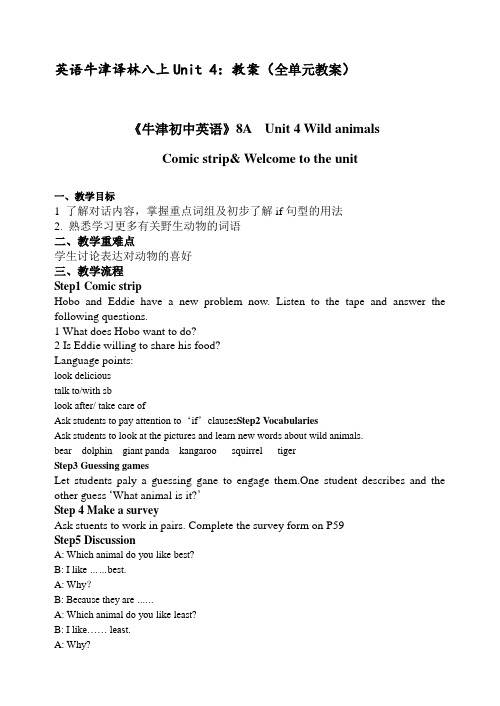
英语牛津译林八上Unit 4:教案(全单元教案)《牛津初中英语》8A Unit 4 Wild animalsComic strip& Welcome to the unit一、教学目标1 了解对话内容,掌握重点词组及初步了解if句型的用法2. 熟悉学习更多有关野生动物的词语二、教学重难点学生讨论表达对动物的喜好三、教学流程Step1 Comic stripHobo and Eddie have a new problem now. Listen to the tape and answer the following questions.1 What does Hobo want to do?2 Is Eddie willing to share his food?Language points:look delicioustalk to/with sblook after/ take care ofAsk students to pay attention to‘if’clauses Step2 VocabulariesAsk students to look at the pictures and learn new words about wild animals.bear dolphin giant panda kangaroo squirrel tigerStep3 Guessing gamesLet students paly a guessing gane to engage them.One student describes and the other guess ‘What animal is it?’Step 4 Make a surveyAsk stuents to work in pairs. Complete the survey form on P59Step5 DiscussionA: Which animal do you like best?B: I like ……best.A: Why?B: Because they are …...A: Which animal do you like least?B: I like…… least.A: Why?B: Because they are …...Step 6 HomeworkRemember all the words about wild animals and try to describe them.《牛津初中英语》8A Unit 4 Wild animalsReading1一教学目标1.知识目标1.)知识并运用本课时的四会单词。

主备:审核:日期:学校_______ 班级______________ 姓名____________ 家长签字 ________【板块要点】一、教学目标1.培养学生的语篇意识2.学习如何写日记,包括段落分布,句子衔接等。
3.学会围绕本单元话题,写一篇关于自己的DIY的日记。
教学重点、难点能结合教材所给的知识点写出关于口己的DIY的日记二、词汇、短语1. be coming 即将來临2. decide to make her a birthday card 决定给她做一张生日贺卡3. by oneself=alone=on one. own 独自,自己4. keep it secret 保密5. plan to make the card 计划制作卡片6. help me with the drawing 帮我画画7. have fun working together 开心的一起工作8. it takes/took me two hours to finish 我花了两小时去完成9. go wrong 弄错,犯错10. keep spelling the words wrong 总是拼错单词11. colour the roses red 把玫瑰涂成红色12. cut out a picture 剪出一张图片13. stick it on the cover 把它粘到封面上14. there is paint on everything 到处都是颜料三、句型(语法)1.keep (on) doing sth. carry on doing sth.2・ decide to do3.plan to do4.have fun (in) doing sth. = have a good time (in) doing sth.5.it takes sb time to do sth6.colour sth +colour7.hope to doHope +句子8.help sb with sth =help sb (to) do主备:审核:日期:2018-08-01学校_______ 班级______________ 姓名____________ 家长签字_________【课前导学】一、词组翻译。
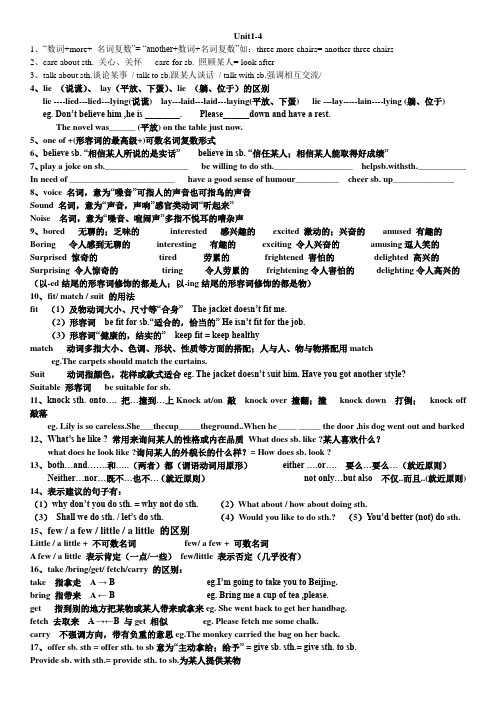
Unit1-41、“数词+more+ 名词复数”= “another+数词+名词复数”如:three more chairs= another three chairs2、care about sth. 关心、关怀care for sb. 照顾某人= look after3、talk about sth.谈论某事/ talk to sb.跟某人谈话/ talk with sb.强调相互交流/4、lie (说谎)、lay(平放、下蛋)、lie (躺、位于)的区别lie ----lied---lied---lying(说谎) lay---laid---laid---laying(平放、下蛋) lie ---lay-----lain----lying (躺、位于) eg. Don’t believe him ,he is ________. Please______down and have a rest.The novel was______ (平放) on the table just now.5、one of +(形容词的最高级+)可数名词复数形式6、believe sb. “相信某人所说的是实话” believe in sb. “信任某人;相信某人能取得好成绩”7、play a joke on sb.___________________ be willing to do sth.__________________ helpsb.withsth.___________ In need of ________________________ have a good sense of humour__________ cheer sb. up______________ 8、voice 名词,意为“嗓音”可指人的声音也可指鸟的声音Sound 名词,意为“声音,声响”感官类动词“听起来”Noise 名词,意为“噪音、喧闹声”多指不悦耳的嘈杂声9、bored 无聊的;乏味的interested 感兴趣的excited 激动的;兴奋的amused 有趣的Boring 令人感到无聊的interesting 有趣的exciting 令人兴奋的amusing逗人笑的Surprised 惊奇的tired 劳累的frightened 害怕的delighted 高兴的Surprising 令人惊奇的tiring 令人劳累的frightening令人害怕的delighting令人高兴的(以-ed结尾的形容词修饰的都是人;以-ing结尾的形容词修饰的都是物)10、fit/ match / suit 的用法fit (1)及物动词大小、尺寸等“合身” The jacket doesn’t fit me.(2)形容词be fit for sb.“适合的,恰当的” He isn’t fit for the job.(3)形容词“健康的,结实的” keep fit = keep healthymatch 动词多指大小、色调、形状、性质等方面的搭配;人与人、物与物搭配用matcheg.The carpets should match the curtains.Suit 动词指颜色,花样或款式适合eg. The jacket doesn’t suit him. Have you got another style?Suitable 形容词be suitable for sb.11、knock sth. onto…. 把…撞到…上Knock at/on 敲knock over 撞翻;撞knock down 打倒;knock off 敲落eg. Lily is so careless.She___thecup_____theground..When he ____ _____ the door ,his dog went out and barked 12、What’s he like ? 常用来询问某人的性格或内在品质What does sb. like ?某人喜欢什么?what does he look like ?询问某人的外貌长的什么样?= How does sb. look ?13、both…and…….和…..(两者)都(谓语动词用原形)either ….or…. 要么…要么…(就近原则)Neither…nor…既不…也不…(就近原则)not only…but also 不仅..而且..(就近原则) 14、表示建议的句子有:(1)why don’t you do sth. = why not do sth. (2)What about / how about doing sth.(3)Shall we do sth. / let’s do sth. (4)Would you like to do sth.? (5)Y ou’d better (not) do sth.15、few / a few / little / a little 的区别Little / a little + 不可数名词few/ a few + 可数名词A few / a little 表示肯定(一点/一些)few/little 表示否定(几乎没有)16、take /bring/get/ fetch/carry 的区别:take 指拿走 A → B eg.I’m going to take you to Beiji ng.bring 指带来 A ← B eg. Bring me a cup of tea ,please.get 指到别的地方把某物或某人带来或拿来eg. She went back to get her handbag.fetch 去取来 A →←B 与get 相似eg. Please fetch me some chalk.carry 不强调方向,带有负重的意思eg.The monkey carried the bag on her back.17、offer sb. sth = offer sth. to sb意为“主动拿给;给予” = give sb. sth.= give sth. to sb.Provide sb. with sth.= provide sth. to sb.为某人提供某物18、In the end = finally at the end of 在…的末尾near the end of 在…快结束时by the end of 到..末尾为止19、Win 及物动词指赢得比赛后面不可加人win the game / the basketball matchBeat 及物动词指打败后面跟人beat sb.20、a number of 与the number of 的区别:“a number of +复数名词”意为“许多”,作主语时,谓语动词用复数;“the number of +复数名词”意为“……的数目”,作主语时,谓语动词用单数。
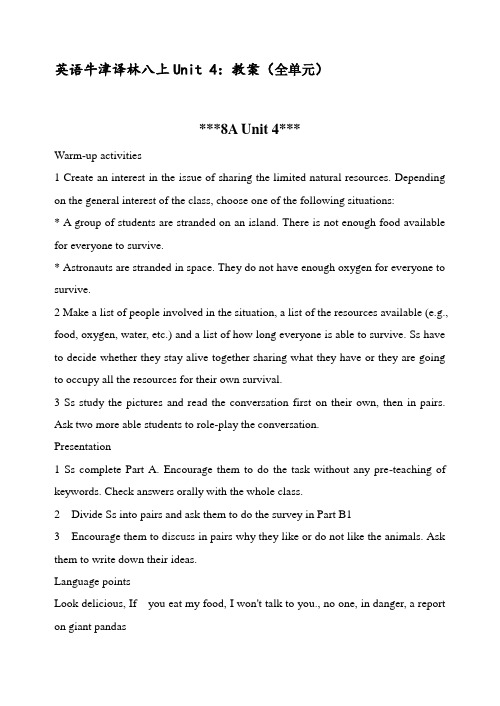
英语牛津译林八上Unit 4:教案(全单元)***8A Unit 4***Warm-up activities1 Create an interest in the issue of sharing the limited natural resources. Depending on the general interest of the class, choose one of the following situations:* A group of students are stranded on an island. There is not enough food available for everyone to survive.* Astronauts are stranded in space. They do not have enough oxygen for everyone to survive.2 Make a list of people involved in the situation, a list of the resources available (e.g., food, oxygen, water, etc.) and a list of how long everyone is able to survive. Ss have to decide whether they stay alive together sharing what they have or they are going to occupy all the resources for their own survival.3 Ss study the pictures and read the conversation first on their own, then in pairs. Ask two more able students to role-play the conversation.Presentation1 Ss complete Part A. Encourage them to do the task without any pre-teaching of keywords. Check answers orally with the whole class.2 Divide Ss into pairs and ask them to do the survey in Part B13 Encourage them to discuss in pairs why they like or do not like the animals. Ask them to write down their ideas.Language pointsLook delicious, If you eat my food, I won't talk to you., no one, in danger, a report on giant pandasHomework1 Learn the language points by heart.2 一课三练P.433 Preview the Reading Part.Revision1 Review key vocabulary according to the general ability of the class. Presentation (Reading A)1 On the Bb, write the following list of sentences on the Bb:* Xi Wang is the name of a baby giant panda.* Baby giant panda s are very small when they were born.* They grow very quickly.* Xi Wang has to find her own food when she is 20 months old.* Hunters kill giant pandas and sell their fur.2 Divide the class into three groups and allocate one part to each group. While students skim the text on their own, ask them to underline the words they do not know. Then go through the words students have underlined. Ask students to explain briefly how they know that the sentences on the Bb are true by identifying and listing key facts in the text.Presentation (Reading B& C)1 Ask Ss to draw a parallel between the growth of the baby giant panda and a human baby. Ask if they know what happens to people while they grow up. Write the following words/phrases on the Bb.Adult old person teenager baby middle-aged personYoung adult child toddlerDraw a timeline and encourage Ss to come forward and write each word at thecorrect point on the timeline. Ask them to draw a more creative growth chart.2 Ask students to do a birth chart of themselves. Tell them to add their photos to the chart.Presentation (Reading D)1 Revise the words listed in the box in Part D.2 Ask students to complete Part D. Then ask some Ss to read the sentences aloud to check their choice of words.3 If they show interest, ask them to practice the text for a presentation for 2-3 minutes.Presentation (Reading E)1 Ask Ss to read the conversation in Part E in pairs to check if there are any words they do not know. Then ask Ss to complete the sentences individually.2 Ask six Ss to read the conversation while the rest of the class check their answers. Language points (Part A)The story of Xi Wang, only 10 days old, it means…, was born, weigh just 100 grams, at four months, for the first time, eight months later, not…any more, grow into, at the very beginning, up to 14 hours a day, bamboo shoots, have to look after herself, have another baby, It is adj. (for sb.) to do, some of the problems, kill it for its fur, nowhere to live, on their own, need help, in danger, take the following actions to do, protect giant pandas, make giant panda reserves bigger, encourage sb. to do, there will beLanguage points (Part B& C)Keep sb./sth. Safe from danger, large areas of land with trees, special areas for wild animals, stay aliveHomework1 Learn the language points by heart.2 一课三练P.44-453 Preview the V ocabulary Part.Presentation (V ocabulary)1 Creat an interest in animals. Try to extend the context by asking Ss if they would like to adopt an animal and , if they do, which one they would choose.2Use the task to check Ss' knowledge of name of animals. Ask Ss to guess the names individually first and then compare with a partner.3 Check answers with the whole class. Read all the words under the pictures and ask Ss to give definitions.Language pointsPolar bear---North Pole, wolf----wolvesHomework1 Learn the language points by heart.2 一课三练P.463 Preview the Grammar Part.Presentation (Grammar Part A)1 Try to elicit the conditional structure by asking questions such as What will happen if you come to school lats? What will happen if you break your favourite toy? Try to think of sentences which reflect Ss' own experience. Write the most interesting answers on the Bb. Ask Ss to include the "If"-clause as well. Read all the sentences again and ask more able Ss to elicit the rule.2 Write some more open "If"-clauses on the Bb and ask Ss to finish the sentences with their own ideas. Help Ss reformulate their ideas into correct sentences and write them on the Bb.3 Ask Ss to match the sentences on their own and then compare answers with a partner. Invite a more able student to read the sentences aloud for the rest of the class to check answers.4 For Part A2, Ask Ss to complete the sentences on their own and then compare answers with a partner. Check answers with the whole class.5 Ask Ss to complete "Work out the rule" at the bottom of page 61.Presentation (Grammar Part B)1 Ask Ss to read through the rules and the sample sentences on their own. Then check understanding by asking them to think of other examples.2 Write several "If"-clauses on the Bb and ask more able Ss to complete them with their own ideas. Remind them to write about repeated and predictable situations instead of possible results.3 Explain the context of Part B1. Revise the words in the box.4 Ask students to complete the sentences individually.5 Ask Ss to read the conversation with a partner checking the accuracy of their sentences. Then check answers with the class.Presentation (Grammar Part B2)1 Try to creat interest in learning interesting things about wild animals. Tell them that Amy's report introduces new information about tigers and wolves.2 Explain the context of writing a report. Revise the structure of conditional sentences.3 Ask Ss to read the report on their own to make sure that there are no unfamiliar words. Then Ss complete the sentences individually and compare them with a partner. Check answers with the whole class.Language pointsGrow more bamboo, run the other way, go to North Africa, walk through a rainforest,learn a lot about wild animals, arrive at noon, see the feeding of animals, get enough information for my class report, attack people, spit poison, step on them, male wolvesHomework1 Learn the language points by heart.2 一课三练P.47-483 Preview the Integrated skills Part.Presentation (Integrated skills A)1 Invite students to talk about what they like about tigers and wolves. Brainstorm any information and general knowledge about the two animals.2 Ask Ss to study the two fact files in pairs. Check the meaning of some of the words.3 Help Ss focus on the general context by asking general questions they may be able to answer while listening for the first time. Write them on the Bb:* What is the name of the largest living cat?* What is Millie's favourite animal?Play the recording. Students listen carefully for keywords to answer the questions.4 Play the recording for again and ask students to find out the missing facts in the fact sheets. Play the tape for the third time for Ss to check the answers.5 Ask Ss to read the letter in pairs and discuss any words they do not understand. Complete the letter without looking at the fact sheetson page 64. Then ask them to look at the fact sheets to check the answers and make corrections if necessary.6 Ask more able Ss to read aloud the letter.Presentation (Integrated skills B)1 Ask students to practice the conversation in pairs and then change roles. Identifyany words or phrases they do not know.2 Ask students to create their own conversation using information from the fact sheets.Language pointsLive as a family, good at hunting other animals, make medicine, friendly towards each other, loss of living areas, make medicine from their bones, buy clothes made of animal fur, look lovely on me, lose one's life, someone else,Homework1 Learn the language points by heart.2 一课三练P.493 Preview the Pronunciation, Main task & Check out Part.Presentation (Pronunciation)1 Remind Ss of communicative purpose of conditional sentences.2 Play the recording for Part A and ask Ss to listen carefully. Ss imitating the rising and falling voice patterns.3 Ask students to read Simon's presentation with correct the rising and falling voices.4 Ask students to read Millie's presentation in Part B quietly on their own. Play the recording . Ask Ss to listen carefully and mark where Millie's voice rises and falls with the correct arrows.5 Tell students to read them again, and answer the 'Wh-'questions. Students work in pairs.Language points (Pronunciation)Peaceful animals, live in family groups, continue to build roads, have suitable homes, make new farmland, make a lot of money, sell elephants' tusks, train them, Presentation(Main task)1 Talk to Ss about the purpose of writing reports. Elicit from the different reports. Explain that in reports, we do not normally say 'I feel…' or 'I like…' and do not include personal comments.2 Read the title of the report in Part A. Create an interest in the topic by asking what they have learnt about giant panda in this unit.3 Ask students to skim through the report quickly and give each paragraph.4 Ss complete Simon's report in Part C on their own. Ask more able Ss to read it aloud to check the answers.Language points (Main task)Spend a lot of time drinking their mums' milk, at a time, get smaller and smaller, become farmlands, keep taking the land, what action can the club take? Sharp paws, walk uprightPresentation (Checkout)1 Set a time limit for reading the sentences in Part A and for filling the blanks. Ask Ss to complete the task on their own.2 Ask students to Proceed to Part B after completing Part A.3 Ss complete Part B on their own and then compare answers in pairs.Language points (Checkout)Climbing, what about playing football?, a friend like Alan, answer questions correctlyHomework1 Learn the language points by heart.2 一课三练P.50-523 Preview the Unit 5。
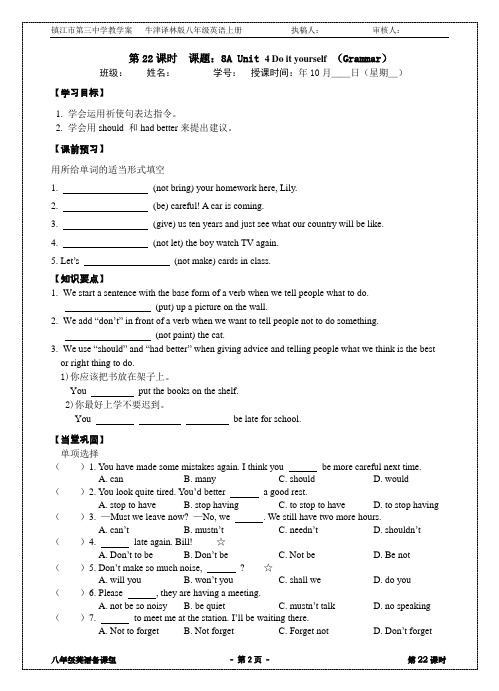
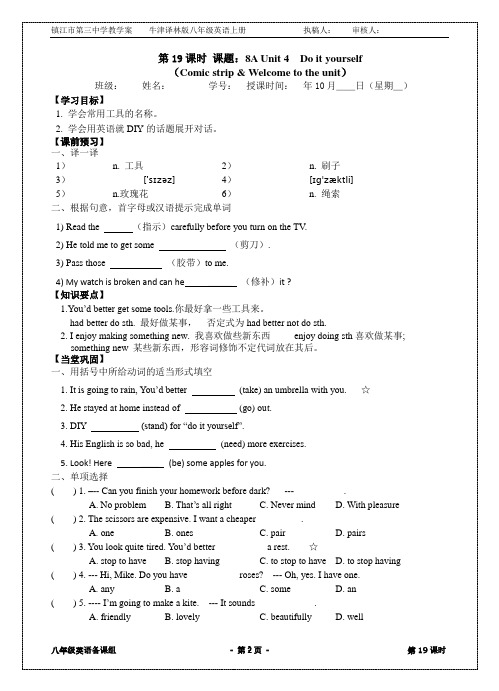
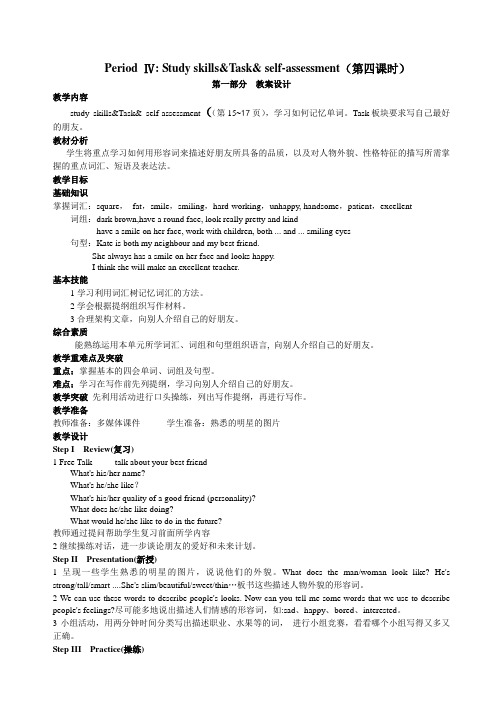
Period Ⅳ: Study skills&Task& self-assessment(第四课时)第一部分教案设计教学内容study skills&Task& self-assessment((第15~17页),学习如何记忆单词。
Task板块要求写自己最好的朋友。
教材分析学生将重点学习如何用形容词来描述好朋友所具备的品质,以及对人物外貌、性格特征的描写所需掌握的重点词汇、短语及表达法。
教学目标基础知识掌握词汇:square,fat,smile,smiling,hard-working,unhappy, handsome,patient,excellent 词组:dark brown,have a round face, look really pretty and kindhave a smile on her face, work with children, both ... and ... smiling eyes句型:Kate is both my neighbour and my best friend.She always has a smile on her face and looks happy.I think she will make an excellent teacher.基本技能1学习利用词汇树记忆词汇的方法。
2学会根据提纲组织写作材料。
3合理架构文章,向别人介绍自己的好朋友。
综合素质能熟练运用本单元所学词汇、词组和句型组织语言, 向别人介绍自己的好朋友。
教学重难点及突破重点:掌握基本的四会单词、词组及句型。
难点:学习在写作前先列提纲,学习向别人介绍自己的好朋友。
教学突破先利用活动进行口头操练,列出写作提纲,再进行写作。
教学准备教师准备:多媒体课件学生准备:熟悉的明星的图片教学设计Step I Review(复习)1 Free Talk -------talk about your best friendWhat's his/her name?What's he/she like?What's his/her quality of a good friend (personality)?What does he/she like doing?What would he/she like to do in the future?教师通过提问帮助学生复习前面所学内容-2继续操练对话,进一步谈论朋友的爱好和未来计划。

英语(八年级上册)Unit 1 FriendsGrammarI. Teaching aims and learning objectivesBy the end of the lesson, students should be able to:1. know when to use comparatives and superlatives;2. use comparatives and superlatives correctly;3. compare people or things.II. Teaching contents1. New words and phrases: height, slimmer, worse, worst;2. New structure: We use “comparatives + than” to compare people or things.We use “the + superlatives” to compare three or more people or things.III. Focus of the lesson and predicted area of difficulty1. Introduce the structure of comparative and superlative adjectives;2. Change the adjectives into comparative and superlative forms.IV. Teaching proceduresStep 1 Lead-in1. Try to describe.Describe two girls’ appearances.2. Try to compareShow a table about two girls’ appearance. Lead the students to compare them.Alice is shorter than Lucy. →Lucy is taller than Alice.Alice’s eyes are bigger than Lucy’s. →Lucy’s eyes are smaller than Alice’s.Alice’s hair is longer than Lucy’s. →Lucy’s hair is shorter than Alice’s.【设计意图:先以一个简短的人物外貌描述作为开头。
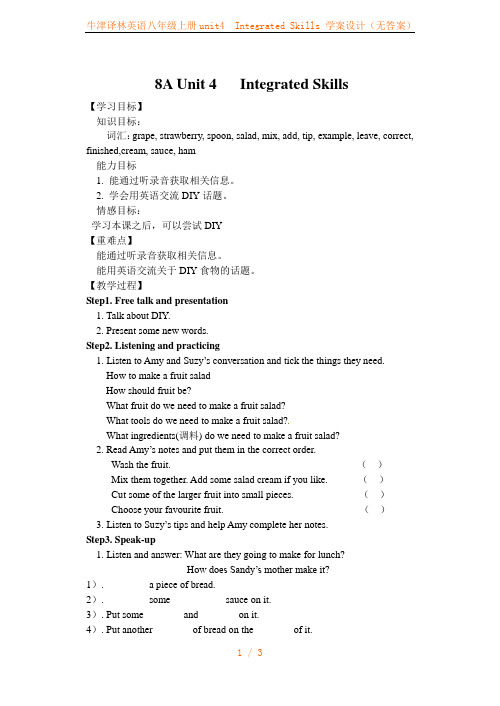
8A Unit 4 Integrated Skills【学习目标】知识目标:词汇:grape, strawberry, spoon, salad, mix, add, tip, example, leave, correct, finished,cream, sauce, ham能力目标1. 能通过听录音获取相关信息。
2. 学会用英语交流DIY话题。
情感目标:学习本课之后,可以尝试DIY【重难点】能通过听录音获取相关信息。
能用英语交流关于DIY食物的话题。
【教学过程】Step1. Free talk and presentation1. Talk about DIY.2. Present some new words.Step2. Listening and practicing1. Listen to Amy and Suzy’s conversation and tick the things they need.How to make a fruit saladHow should fruit be?____________________What fruit do we need to make a fruit salad? ____________________What tools do we need to make a fruit salad?____________________What ingredients(调料) do we need to make a fruit salad? _____________ 2. Read Amy’s notes and put them in the correct order.Wash the fruit. ()Mix them together. Add some salad cream if you like. ()Cut some of the larger fruit into small pieces. ()Choose your favourite fruit. ()3. Listen to Suzy’s tips and help Amy complete her notes.Step3. Speak-up1. Listen and answer: What are they going to make for lunch?How does Sandy’s mother make it?1). ________ a piece of bread.2). ________ some __________ sauce on it.3). Put some _______ and _______ on it.4). Put another _______ of bread on the _______ of it.3. Try to make similar dialogues.How to make noodlesStep4. HomeworkFather’s day is coming. Try to make a fruit salad for him.课前预习根据句意和首字母完成句子1. My m other ________(混合)some fruits to make fruit salads for us yesterday evening.2. How big the _____________ (西瓜)is!3. Excuse me. Can you tell me the _____________ (正确的)answer?4. We don't like eating_____________ (葡萄)5. Don’t _______ the stove (炉子) on when you are away. It’s dangerous. / liːv /6. If you a_____________ 4 to 5,you will get 9.7. Can you give me _____________ of what you mean? (例子)8. I need some _____________ (草莓) to make a fruit _____________ (沙拉).9. There are some _____________ for making sandwiches. (提示)10. ---What else do you want?---I want two more _____________. (调羹)二、用所给词的适当形式填空。
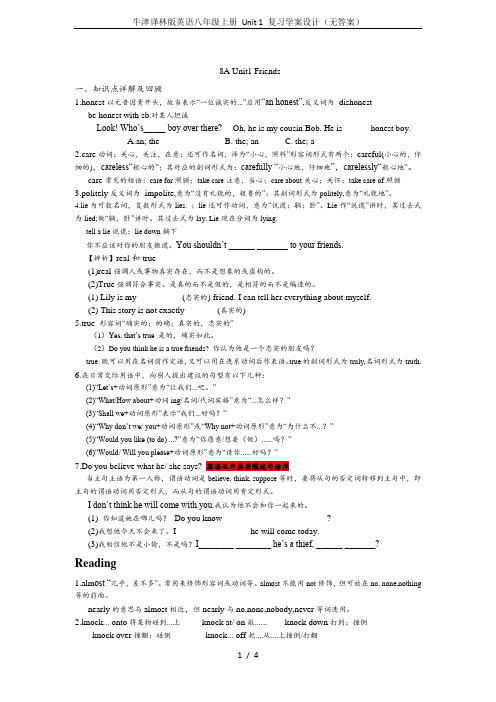
8A Unit1 Friends一、知识点详解及回顾1.honest以元音因素开头,故当表示“一位诚实的...”应用“an honest”,反义词为dishonestbe honest with sb.对某人坦诚---Look! Who’s_____ boy over there? ---Oh, he is my cousin Bob. He is______ honest boy.A.an; theB. the; anC. the; a2.care动词:关心,关注,在意;还可作名词,译为“小心,照料”形容词形式有两个:careful(小心的,仔细的),careless“粗心的”;其对应的副词形式为:carefully “小心地,仔细地”,carelessly“粗心地”。
care常见的短语:care for照顾;take care注意,当心;care about关心;关怀;take care of照顾3.politely反义词为impolite,意为“没有礼貌的,粗鲁的”;其副词形式为politely,意为“礼貌地”。
4.lie为可数名词,复数形式为lies. ;lie还可作动词,意为“说谎;躺;卧”。
Lie作“说谎”讲时,其过去式为lied;做“躺,卧”讲时。
其过去式为lay. Lie现在分词为lying.tell a lie说谎;lie down躺下你不应该对你的朋友撒谎。
You shouldn’t ______ _______ to your friends.【辨析】real和true(1)real强调人或事物真实存在,而不是想象的或虚构的。
(2)True强调符合事实。
是真的而不是假的,是相符的而不是编造的。
(1) Lily is my__________ (忠实的) friend. I can tell her everything about myself.(2) This story is not exactly_______ (真实的)5.true 形容词“确实的;的确;真实的,忠实的”(1)Yes, that’s true 是的,确实如此。
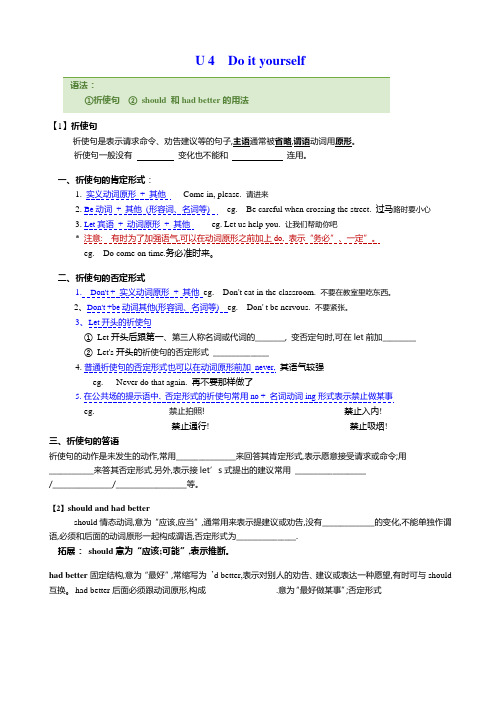
U 4 Do it yourself【1】祈使句祈使句是表示请求命令、劝告建议等的句子,主语通常被省略,谓语动词用原形。
祈使句一般没有变化也不能和连用。
一、祈使句的肯定形式:1.实义动词原形+ 其他Come in, please. 请进来2.Be动词+ 其他(形容词、名词等) eg. Be careful when crossing the street. 过马路时要小心3.Let宾语+ 动词原形+ 其他eg. Let us help you. 让我们帮助你吧*注意: 有时为了加强语气,可以在动词原形之前加上do, 表示“务必”、一定”。
eg. Do come on time.务必准时来。
二、祈使句的否定形式1. Don't + 实义动词原形+ 其他eg. Don't eat in the classroom. 不要在教室里吃东西。
2、Don't +be动词其他(形容词、名词等) eg. Don' t be nervous. 不要紧张。
3、Let开头的祈使句①Let开头后跟第一、第三人称名词或代词的________, 变否定句时,可在let前加__________②Let's开头的祈使句的否定形式_______________4.普通祈使句的否定形式也可以在动词原形前加never,其语气较强eg. Never do that again. 再不要那样做了5.在公共场的提示语中, 否定形式的祈使句常用no + 名词动词ing形式表示禁止做某事eg. _______________禁止拍照! ___________________ 禁止入内!_______________ 禁止通行! ____________________ 禁止吸烟!三、祈使句的答语祈使句的动作是未发生的动作,常用________________来回答其肯定形式,表示愿意接受请求或命令;用____________来答其否定形式.另外,表示接let’s式提出的建议常用___________________/________________/___________________等。
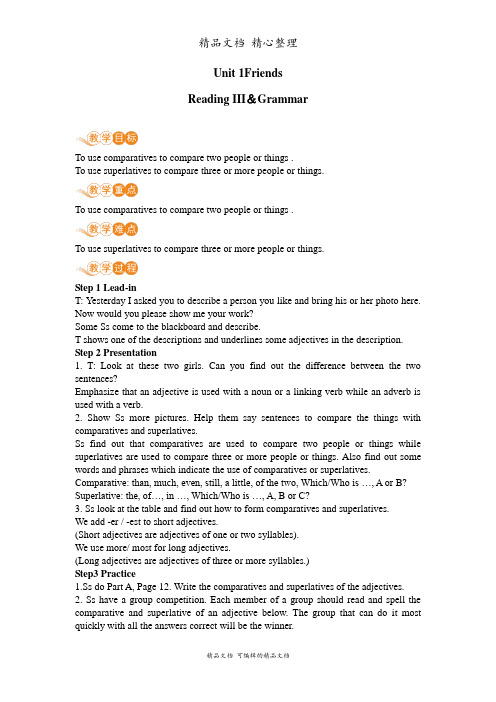
Unit 1FriendsReading III&GrammarTo use comparatives to compare two people or things .To use superlatives to compare three or more people or things.To use comparatives to compare two people or things .To use superlatives to compare three or more people or things.Step 1 Lead-inT: Yesterday I asked you to describe a person you like and bring his or her photo here. Now would you please show me your work?Some Ss come to the blackboard and describe.T shows one of the descriptions and underlines some adjectives in the description. Step 2 Presentation1. T: Look at these two girls. Can you find out the difference between the two sentences?Emphasize that an adjective is used with a noun or a linking verb while an adverb is used with a verb.2. Show Ss more pictures. Help them say sentences to compare the things with comparatives and superlatives.Ss find out that comparatives are used to compare two people or things while superlatives are used to compare three or more people or things. Also find out some words and phrases which indicate the use of comparatives or superlatives. Comparative: than, much, even, still, a little, of the two, Which/Who is …, A or B? Superlative: the, of…, in …, Which/Who is …, A, B or C?3. Ss look at the table and find out how to form comparatives and superlatives.We add -er / -est to short adjectives.(Short adjectives are adjectives of one or two syllables).We use more/ most for long adjectives.(Long adjectives are adjectives of three or more syllables.)Step3 Practice1.Ss do Part A, Page 12. Write the comparatives and superlatives of the adjectives.2. Ss have a group competition. Each member of a group should read and spell the comparative and superlative of an adjective below. The group that can do it most quickly with all the answers correct will be the winner.1) light old healthy cheerful2) safe thirsty slim bad3) bright new much bored4) sad heavy straight clearly3. Ss do Part B, P12. Complete the sentences according to the profile.4. Ss make up a dialogue in pairs to compare people or things. They can choose any topic of the following: animals, sports, food and drinks, people in this classroom.T provides some pictures, words, phrases and sentences which may be useful to Ss. 5. Ss do some multiple choice and translation work.Step 4 SummarizeT: This class we learnt the use of adjectives, comparatives and superlatives. Now let’s read an interesting English poem as the end of this lesson.Good, better, best,Never let it rest,Till your good is better,And your better is best!Revise the use of adjectives, comparatives and superlativesComplete the exercises in the workbook。
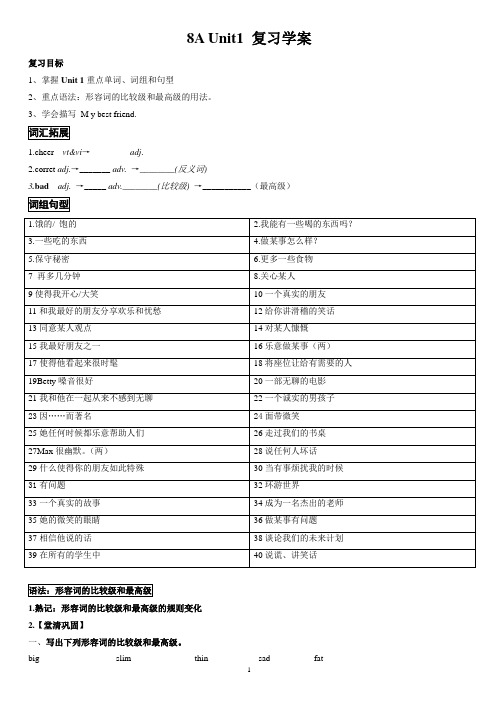
8A Unit1 复习学案复习目标1、掌握Unit 1重点单词、词组和句型2、重点语法:形容词的比较级和最高级的用法。
3、学会描写M y best friend.1.cheer vt&vi→_________adj.2.corret adj.→_______ adv.→________(反义词)3.bad adj.→_____ adv.________(比较级)→___________(最高级)1.熟记:形容词的比较级和最高级的规则变化2.【堂清巩固】一、写出下列形容词的比较级和最高级。
big_________ ______ slim ______ _______ thin _____ _____ sad____ _____ fat_______ ______many / much______ _____ far_______ ________ old _____ _____ bad badly ______ _______good well _______ ________ heavy_______ _________ tired________ ________ fast_______ _______clever_______ ______little________ _______friendly_______ _______important ________ _______famous_______ ______helpful______ ______ tidy ______ _______ interesting_________ ________difficult ____________ ___________interesting _____________ ______________ _3.形容词的比较级和最高级的用法。
例句:My cousin is taller than I am. This is the most interesting story in the book.★两者之间用,比较级句中词般有:______ ;______ ;______ ;a little;which…,A or B ?;比较级and比较级;the 比较级…,the 比较级…;of the two。
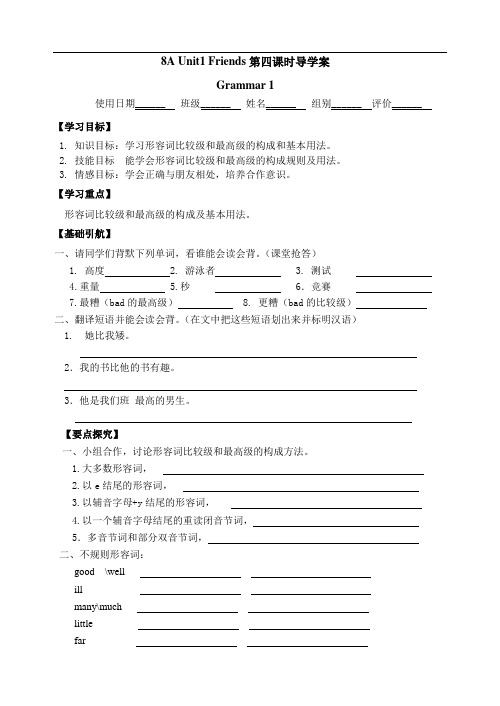
8A Unit1 Friends第四课时导学案Grammar 1使用日期______ 班级______ 姓名______ 组别______ 评价______ 【学习目标】1. 知识目标:学习形容词比较级和最高级的构成和基本用法。
2. 技能目标能学会形容词比较级和最高级的构成规则及用法。
3. 情感目标:学会正确与朋友相处,培养合作意识。
【学习重点】形容词比较级和最高级的构成及基本用法。
【基础引航】一、请同学们背默下列单词,看谁能会读会背。
(课堂抢答)1. 高度2. 游泳者3. 测试4.重量5.秒 6.竞赛7.最糟(bad的最高级) 8. 更糟(bad的比较级)二、翻译短语并能会读会背。
(在文中把这些短语划出来并标明汉语)1. 她比我矮。
2.我的书比他的书有趣。
3.他是我们班最高的男生。
【要点探究】一、小组合作,讨论形容词比较级和最高级的构成方法。
1.大多数形容词,2.以e结尾的形容词,3.以辅音字母+y结尾的形容词,4.以一个辅音字母结尾的重读闭音节词,5.多音节词和部分双音节词,二、不规则形容词:good \wellillmany\muchlittlefaroldclever三、完成P12页PartA,Part B。
【巩固拓展】一、单选(方法:认真审题并圈画关键词)( ) 1. My mother is _______ in our family.A.busiestB.the busiestC.busierD.busy( ) 2. This apple is _______ of all.A.redderB.the redestC.the reddestD.reddest( ) 3.Which pen is _______ , this one or that one?A.dearB.dearestC.the dearestD. dearer( ) 4 T.he Changjiang River is in the world .A . the longerB . the long riverC. one of the long riversD. one of the longest rivers▲( ) 5. Kate is ______ than all the other girls. She is _______ of all.A.taller , tallestB. taller , the tallestC. the tallest , tallestD. tallest , the tallest★()6.Now the air in our hometown is _______ than it was before.A. much betterB. more worseC. more betterD. much worst二、根据汉语提示完成句子。
期末复习1-4一词汇检测1.She has a good ______,so we all think she will be a singer in the future.2.-Do you know the ______of the tower? -About 20 meters tall.3.He is an________(杰出的)teacher。
4.I thought it would be sunny,but it is even______today.(多雨)5.If you want f________information,please visit our website.6.I missed the _____of the film yesterday,so please tell me what happened at last in the film?7.Apple is to fruit as French is to_________.8.The ______ of the trip is too high,so we want to cancel it.9.With the development of the Internet,information can r______every corner of the world.10.-Is it p______for us to learn all of the English words? -Nobody can do it,even though he is a native speaker.11.The cat _____ can’t go any farther because of its leg wound.12.Since you are moving into a new house,I think you need to buy some f_______.13.He was shy in the past,but now he is a________ and often shares his happiness with us.14.Don’t _______such things in school.You should talk more about your study,Lily.15.In America,people usually use‘________’to express the word rubber.16.He takes an _______in English,so he often gets high marks.17.I hate tea.I’d like to have a cup of milk i_________.18.She didn’t a_______school yesterday because of her illness.19.Read these_________carefully before using the machine.20.The film was_______famous around the world,but now few people know it.答案:voice/height/excellent/rainier/further/end/language/cost/reach/possible/itself/furniture/active/ discuss/eraser/interest/instead/attend/instructions/once二语法聚焦1.比较级与最高级的定义2.形容词最高级前用定冠词the3.of the two的结构中,比较级前须用定冠词the4.as...as...中间用形容词和副词原级5.less 原级than 不如6.one of +adj最高级+名词复数7.比较级的比较对象any other+名词单数与any+名词单数8.形容词的比较级前有哪些修饰词9.指示代词在比较级句型中的考点10.T he+比较级+句子,the +比较级+句子11.b etter and better12.m ore and more beautiful13.语境分析法14.比较级与否定词连用表肯定或最高级含义15.形容词的比较级前用不定冠词表示又一,再一[热身练习]1.Jack is ______of the two boys.A.tallerB.tallC.the tallerD.the tallest2.-What do you think of the movie?-Pretty good.I have never seen _____ better film than this.A./B.a B.an D.the3.Shanghai is larger than________in Anhui Province.A.any cityB.any other cityC.any citiesD.any other cities4.China is larger than______in Asia.A.any countryB.any other countriesC.the other countriesD.any countries5.The weather in Beijing is colder than ________Hangzhou.A.the oneB.thisC.thatD.weather6.Shaoxinng is one of_________________in China.A.the most beautiful cityB.most beautiful citiesC.the most beautiful citiesD. D.most beautiful city7._________you are,_________mistakes you will make.A.More careful,fewerB.Most careful,fewestC.The more careful,the fewerD..The most careful,the fewest8.I think France is _________________Japan.A.as beautiful thanB.as beautiful asC.so beautiful asD.as more beautiful9.The red one is_________the blue one,so will choose the blue one.A.more beautiful thanB.so beautiful asC.as beautiful asD.less beautiful than10.Lin Tao is the second_________boy on my class.A.tallestB.the tallest B.taller D.the taller11.Today I am feeling_______worse.A.veryB.tooC.reallyD.even12.The books in this store are more expensive than________in Mr Zhang’s.A.thatB.theseC.onesD.the ones13.This is _________film I have ever seen.A.the bestB.the betterC.the betterD.best14.Lucy is ________of the four.A.the naughtyB.the more naughtyC.most naughtyD.the most naughty15.Today it is_________than yesterday.A.more hotterB.much more hotterC.hotter moreD.much hotter答案:CBACD CCBDA DDADD三语言知识探究1.keep a secret for sb/keep it secret to oneselfWe should keep secrets for our friends.We have to keep it secret to ourselves.2.offer sb sth/offer sth to sb/offer to doOffering others help is a kind act.Offering help to others is a kind act.I offer to clean the classroom by myself.3.in the end/at the end ofIn the end,I found my way out.[相当于at last/finally/eventually]At the end of the road lies a beautiful lake.At the end of the race,I dropped.We will have a monthly test on each subject at the end of this month.4.get to/arrive/reachHow can I get to /reach/arrive at the bus stop?I got/arrived home at 6 around o’clock.When did you arrive?When the news arrived,I got excited.5.get on/get offThe bus is leaving.Let’s get on it.6.happen/take placeA car accident happened to Jack yesterday.What’s happening over there?It is so noisy.I happened to meet my old friend yesterday.The match will take place tomorrow.7.instead/instead ofI am tired of endless work,so I want to do something interesting instead.She hates playing the piano.Instead,she likes violin.It is raining so hard.I have to stay at home instead of having a picnic with my friends.8.Not only...but alsoThe film is famous not only in China but also in foreign countries.Not only I but also Jack is interested in math.Not only do I want to study abroad,but also I want to work there.9.adviseMy teacher often advises me to study hard.I advised seeing a doctor at once.I advised that you (should) not go home so early.10.join/attend/take part in/join inJoin+[club/army/league/Party/sb.etc] →join sb in doing sth 加入某人做某事Attend[course/school/meeting,etc]Join in/take part in+[game/match/activity,etc]11.spend/take/cost/pay①How long does it ______us to get to school?②I ______twenty yuan on this book yesterday.③The trip _______two thousand yuan and _______a week.④She spent ten minutes__________(practice)playing the piano yesterday.⑤Yesterday Jack______forty dollars for the T-shirt he is wearing now .12.look through/look up/look up to/look down/look down on/look back on/look for/look at/look after/look forward to①You can ______a new word in a dictionary.②Please help me_____my goldfish while I am away.③______the blackboard.④_______a passage first before you read it carefully.⑤I am ___________a happy new year.⑥_________my childhood is really nice.⑦She is still______her pet dog,but I think it is hard to find.13.put up/put down/put in/put on/put off/put out/put forward/put up with/put in①I am going to ask someone ______a new light in my bedroom.②We decide to_______the sports meeting because of the heavy rain.③We need to _____a tent if we sleep in the wild.④She will_______a school play at Christmas.⑤Remember to _____the cigarette.⑥I will______a new poster on the wall.14.discuss sth with sb=talk about sth with/to sbI am discussing my new year’s plan.I am talking my new year’s plan.15.You’d better (not) do 你最好做(不)做某事You ‘d better finish your homework first.16.enjoy oneselfby oneselffor oneselfof oneselfhelp oneself to。